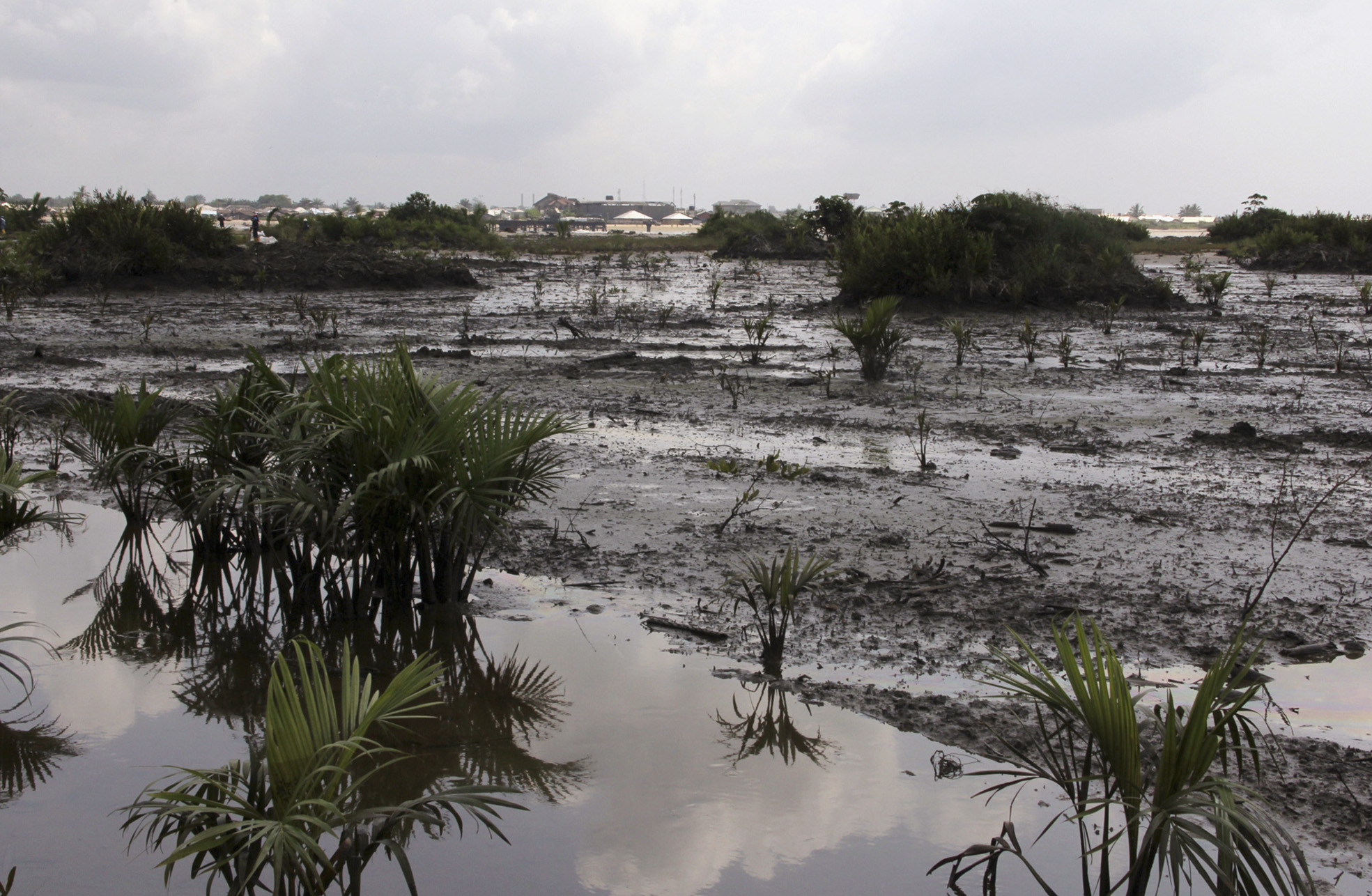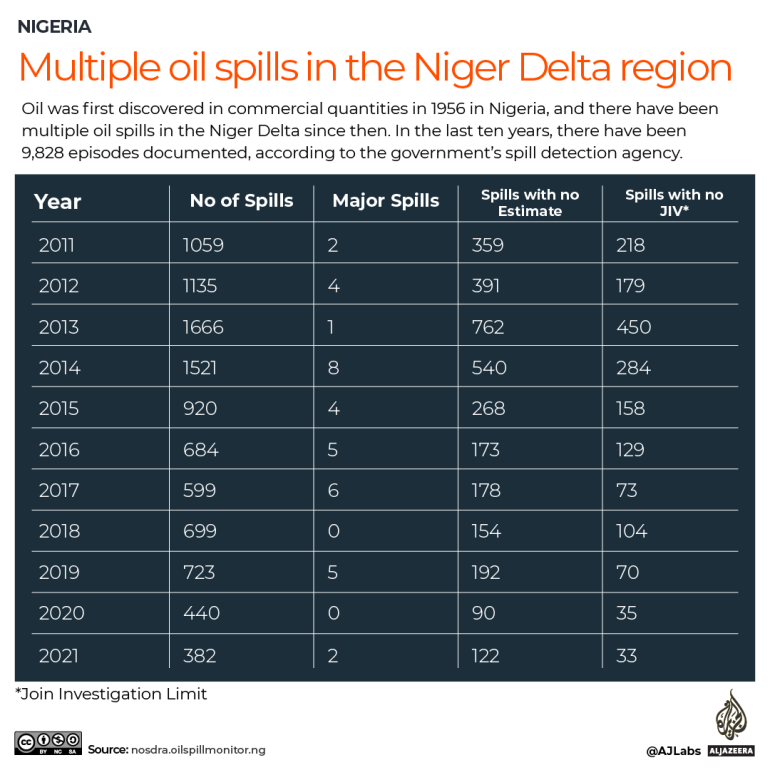
Yenagoa, Nigeria – This June, Aibakuro Warder was disappointed by the size of the yam and cassava tubers she harvested from her farms in Ikarama, a community in the southernmost Nigerian state of Bayelsa. Most were tiny and in some locations, there was no yield.
“This is what we have been dealing with since oil spills started,” the 51-year-old mother of five said. “It makes it difficult for me to feed my family and train my children in school because that is the only thing I do”.
Thirty years ago there were no spills, Warder recalls. Then she would go to the farm with her mother and grandmother. The harvest was always bountiful, she said, sometimes up to 20 bags and sometimes more.
Yam tubers were huge and sometimes up to three feet (91 cm) tall, she said. And they sold every farm produce they took to the market and bought whatever they wanted on their way back, she added.
Now all of that has changed.
These days, Warder is forced to accept whatever amount buyers offer for her tubers at the market because the produce is tiny. And the proceeds are insufficient to buy basic items at the market for her children or cater to their education.
“It is better we don’t even cultivate because our crops die after planting and we must replant repeatedly,” she said. “As we dig the soil, we find crude oil during planting,”. “Some species of cocoyam have disappeared.”
She is not alone. Dominion Ibatou, 67 is yet to harvest anything from his farm in Ikarama because the plants are stunted. Washington Odoyibo, another farmer in the community, has waited for two years for his plantain seeds to yield, but they have not.
The Niger Delta region, home to more than 6.5 million people who depend on fishing and farming, has all-year-round agricultural production activities by virtue of being in the country’s rainforest and mangrove forest vegetative zones of Nigeria.
But it also houses all of the deep oil and gas reserves that have accounted for more than 70 percent of Nigeria’s foreign revenue since the 1970s.
And industry insiders say six 60 years of oil exploration have turned it into one of the most polluted places on earth and ruined among other things, farmlands.
In 2015, research published in the International Journal of Environmental Sciences by scientists from the Federal University of Technology, Owerri in Imo – one of the states in the region – showed that an average of 150 spills had been recorded annually in the 60 years before.
In 2020 and 2021, Nigeria’s National Oil Spill Detection and Response Agency (NOSDRA) recorded a combined total of 822 oil spills, resulting in 28,003 barrels spewing into the environment.
Last December, a month-long spill in Nembe community in Bayelsa led to youths protesting there and in the streets of the capital Yenagoa.
These repeated spills and their effect on crop yields have led to a decline in local food production and deepened poverty in communities in the Niger Delta.
“This has contributed to an increase in the price of food,” said Nnimmo Bassey, an environmental rights activist and director of the Health of Mother Earth Foundation (HOMEF). “Quality of food consumed has also been affected”.
In Goi in neighbouring Rivers State, community leaders say crude oil seeps out of the fermented cassava as it is processed by local women making the staple meal of garri, rendering it unsafe for consumption.
In 2021, a Dutch court ordered the Nigerian subsidiary of Shell to compensate four farmers from Oruma in Ogbia in Bayelsa who had instituted a case against the company for a 2008 oil spillage they say affect their farms and yields.
‘Ikarama has lost its place’
One hotspot is Ikarama, a fishing and farming community in Bayelsa state, with an estimated population of 50,000 people. According to Morris Alagoa, Yenagoa-based head of field operations, Environmental Rights Action/Friends of Earth Nigeria (ERA/FoEN), it has the highest frequency of oil spill incidents in the state.
While there is no accurate data on the number of spills in the community, Alagoa says at least 100 spills have been recorded between 2007 and 2022.
Between June and December 2008 alone, five oil spills from Shell’s facility were recorded in Ikarama. In 2011, at least twelve oil spills and two fire outbreaks were reported in the community.
“Ikarama has lost its place as a food hub,”, Charles Oyibo, a lecturer at the department of Geography and Environmental Management at the Niger Delta University.
He said his unpublished research shows that most of the food items sold at the Ikarama market, come from other communities.
The oil companies operating there are Shell Petroleum Development Company [SPDC] and Nigerian Agip Oil Company [NAOC/Eni].
Alagoa alleges that most of these spills were from SPDC pipelines close to residential buildings and farmlands. Other spills have also occurred along Agip pipelines.
While SPDC claims that the spill sites in Ikarama have been cleaned and remediated in accordance with industry standards, civil society groups say they have documented testimonies from locals, with indications to the contrary.
“We visited one of the locations where oil spills occurred in August 2021 and after we cleared and dug a fresh spot, we discovered crude oil at a depth of more than one metre (100cm), “Alagoa recalled.
Third-party interference
Locals have linked most of the spills – including that of April 2021, when one of the pipelines operated by the SPDC discharged 213 barrels of crude oil into Ikarama – to equipment failure. But the company often blames illegal third-party interference (sabotage).
Locals say they have always wanted to protest for a proper clean-up but Ibatou claims that they are often intimidated by the presence of security operatives in the community.
Oyibo told Al Jazeera that some locals are in cahoots with oil companies, hence the continued spills and no efforts to curb it.
“Until the community realises that their livelihoods depend on their lands, they will continue to allow a few people to benefit at their instance,” he said, adding that those with polluted farmlands are too scared to protest.
And now, Warder and her peers say they are now considering trading options as an alternative source of livelihood. Some of them now hew firewood from nearby bushes to sell.
“I have been looking for how to get soft loans from the government or any organisation that will be willing to help me because I can’t go back to farming,” said Warder.







